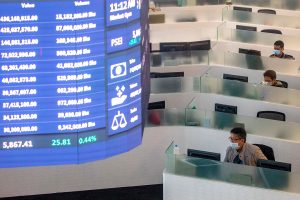By Revin Mikhael D. Ochave, Reporter
THE Philippine Stock Exchange index (PSEi) could still settle as high as the 7,800 level by yearend, although global economic uncertainties may affect this outlook, analysts said.
“We are keeping our PSEi target for 2025 at 7,800, based on a 13x price-to-earnings ratio and an anticipated 10% growth in earnings per share for 2025,” Unicapital Securities, Inc. Research Head Wendy B. Estacio-Cruz told BusinessWorld in a Viber message.
She said key drivers for the PSEi include a further decline in interest rates, as well as the results of the tariff negotiations with the US.
“Clear signs of compromise could boost confidence, while setbacks may trigger renewed sell-offs in vulnerable sectors. Investors will need to see more stability in trade policy for any market bounce to have legs,” she added.
Ms. Estacio-Cruz said one of the main risks is global trade uncertainty, which could weaken investor demand.
“In our view, tariff-related uncertainty and shifting trade dynamics may weaken the peso by cutting export revenues and investor demand, limiting the central bank’s ability to lower interest rates,” she said.
“Although the 90-day tariff pause has provided short-term relief, elevated tariffs on Chinese goods and potential policy shifts may keep markets volatile,” she added.
On Monday, the PSEi closed 1.03% or 63.08 points higher at 6,145.52, while the broader all shares index went up by 0.16% or 6.13 points to 3,627.89.
The PSEi has since recovered after it dropped by 4.3% to close at 5,822.85 on Monday, April 7, its lowest close in 30 months amid tariff uncertainties.
The close on April 7 also signaled the PSEi’s return to bear market territory as it was down by 23.4% from the immediate high of 7,604.61 posted on Oct. 7 last year.
The Trump administration last week suspended for 90 days the higher reciprocal tariffs on most of the US’ trading partners. This meant all countries including the Philippines will be imposed the blanket 10% tariff until July.
US President Donald J. Trump had imposed a 17% tariff on the Philippines, among the lowest in the Southeast Asia, only second to Singapore’s baseline rate of 10%.
DragonFi Securities, Inc. Equity Research Analyst Jarrod Leighton M. Tin said in a Viber message that the PSEi is projected to end near the 6,800 level this year.
“We see the PSEi closing near the 6,800 level despite global headwinds such as the ongoing global trade war. The PSEi is set to benefit from low inflation which gives the Bangko Sentral ng Pilipinas (BSP) room to cut interest rates and lower the reserve requirement ratio to boost liquidity and economic activity,” he said.
On Thursday, the BSP reduced the target reverse repurchase rate by 25 basis points to 5.5% from 5.75%. Rates on the overnight deposit and lending facilities were also eased to 5% and 6%, respectively.
BSP Governor Eli M. Remolona, Jr. on Friday signaled a cautious approach on further policy easing to avoid reigniting inflation and to support the Philippine economy amid global uncertainties.
Mr. Tin also said the Philippines is “one of the more insulated nations in terms of the global trade war, which hopefully leads to more interest from foreign flows.”
In a Viber message, AP Securities, Inc. Research Head Alfred Benjamin R. Garcia said he lowered the target level for PSEi to 7,546 from the initial estimate of 7,752 due to earnings risks and projected slower economic growth amid trade uncertainty.
“Full-year 2025 earnings growth has been revised lower to 9.7% from 10.3% as local companies with global exposure start to feel the bite of Mr. Trump’s trade war and its effect on the global economy,” he said.
Mr. Garcia said Razon-led ports operator International Container Terminal Services, Inc. (ICTSI) may be affected since it is highly exposed to global trade.
“As for companies to avoid, top of mind would be ICTSI due to its exposure to global trade. However, we acknowledge that its ports mainly operate in countries that can potentially benefit from the realignment of trade flows following Trump’s trade war,” he said.
Mr. Garcia said another company that investors should be cautious of is fastfood giant Jollibee Foods Corp. (JFC).
“While JFC remains one of our top consumer picks, it is also a name to watch as it derives a significant portion of its revenues (39%) from overseas and this opens up the company to more risk,” he said.
Ms. Estacio-Cruz said consumer-related companies, especially those involved in manufacturing, will be most affected by global trade uncertainties due to rising input costs.
She added that the banking and retail sectors could be less likely to be impacted by the ongoing trade war.
“However, if the trade war continues to escalate, the banking sector may face slower credit growth due to delayed expansion in trade-exposed sectors like electronics and manufacturing,” she said.
Meanwhile, Mr. Tin said investors should consider companies in “defensive” sectors at this time.
“The sectors we continue to be optimistic on are defensives such as utilities, real estate investment trusts, telecommunications, power, and banking,” he said.
“The sectors we want to avoid are property, select export heavy consumer names, and physical gaming,” he added.
